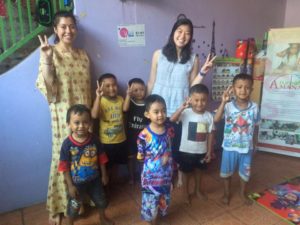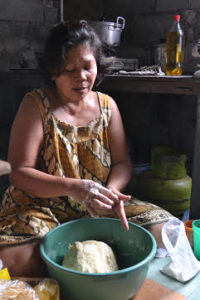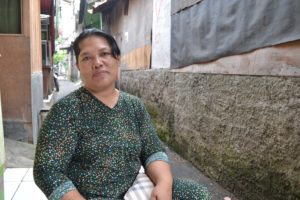Women's School for Peace: Fighting for Gender Equality in Indonesia
 In the depths of East Jakarta sits a neighborhood called Pondok Bambu. This neighborhood rests beside the river, a location known by all to be a lower-economic status area. While Pondok Bambu holds this reputation on a spatial perspective, close up it actually is an area that provides economic relief and job opportunities to many citizens. Most of its current residents are women who moved far from their families and hometowns to this area. As a result, a group of diverse people have learned to live and flourish alongside each other in this tight-knit community.
In the depths of East Jakarta sits a neighborhood called Pondok Bambu. This neighborhood rests beside the river, a location known by all to be a lower-economic status area. While Pondok Bambu holds this reputation on a spatial perspective, close up it actually is an area that provides economic relief and job opportunities to many citizens. Most of its current residents are women who moved far from their families and hometowns to this area. As a result, a group of diverse people have learned to live and flourish alongside each other in this tight-knit community.
However, it’s not always rainbows and butterflies. Made up of about thirteen thousand islands, Indonesia is known as the largest island country in the world. Given its size and archipelagic form, this country is home to hundreds of ethnic groups and many different languages; each island is its own separate entity, if not a sovereign one. So, gathered together in these narrow streets and crowded homes, this community struggles with its cultural differences. Yet religious and ethnic intolerance are not the only problems that persist throughout the community; gender inequality also haunts the women of Pondok Bambu.
After a devastating flood in 2007 demonstrated the community's inability to rebuild efficiently together, the women grew tired of being imprisoned within their restricted lifestyles and asked for a school. The Women’s School for Peace (WSP) teaches women how “to be more clever.” Clever in the sense of learning how to work beside their husbands, how to negotiate with others to establish equal rights for all, especially women, and how to use peace methods to resolve issues.
The Asian Muslim Action Network (AMAN), also established a program for women to meet about four times a month in order to learn about the power of education, their rights and roles as women and as members of society, and the strength to use their voices to address issues among their family and community.
With a translator beside me, I went out into the neighborhood to interview women with different ethnic backgrounds, levels of education, and (though the community is predominantly Muslim), different religions. What was most commonly agreed upon was that women are treated with less respect than they deserve. Some women told us that they are not allowed to leave the house unless given permission, that they do not enjoy the responsibilities of being wives and mothers, and that they felt no happiness in their daily lives.
One woman, a very active member of WSP, told me that she thought marriage would be her ticket to freedom, but instead, she felt even more confined to her responsibilities. She said she was so incredibly unhappy. I asked her if she was still married, and, to my surprise, she said yes. She explained to me how things have changed in the community since the school was established: 1) women feel more empowered to speak up and work beyond the household, 2) the community, especially its men, are beginning to adapt and support the empowerment of women, and 3) Pondok Bambu’s people have become closer because they are pushed to get to know one another past the generalizations of each other´s ethnicities and religions. They want the world to know that being Muslim does not mean that they cannot live in harmony with others. In fact, the friendships created among women contributed to the third aforementioned change.
This community thrives and continues to expand its efforts. Now it also focuses on children. Rumah Amanah, a home for up to five young orphaned girls, is located in the center of the community. It houses not only orphans according to the traditional definition but also girls who cannot live at home due to economic circumstances or lack of space. It was established to help fund the girls’ education and teach them that there is life beyond the kitchen and Pondok Bambu.
Ultimately, AMAN and this community of women proved that empowerment comes in various forms and is not determined solely by what one might quantify success to be. It is breaking the mold of political norms by having a female neighborhood representative, becoming one of the leading women at WSP to work outside the small confines of Pondok Bambu, and, most importantly, being happy in the home.



